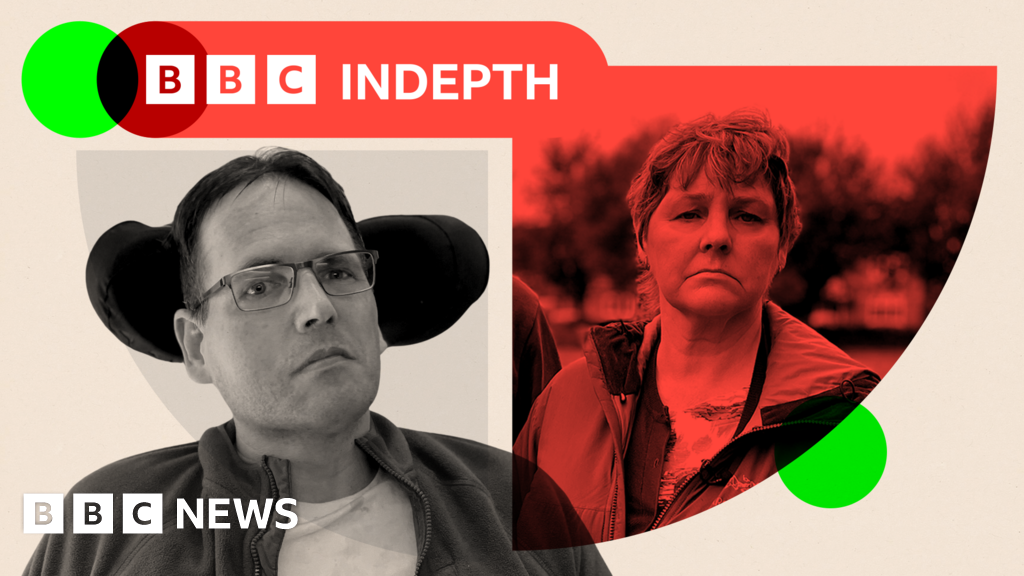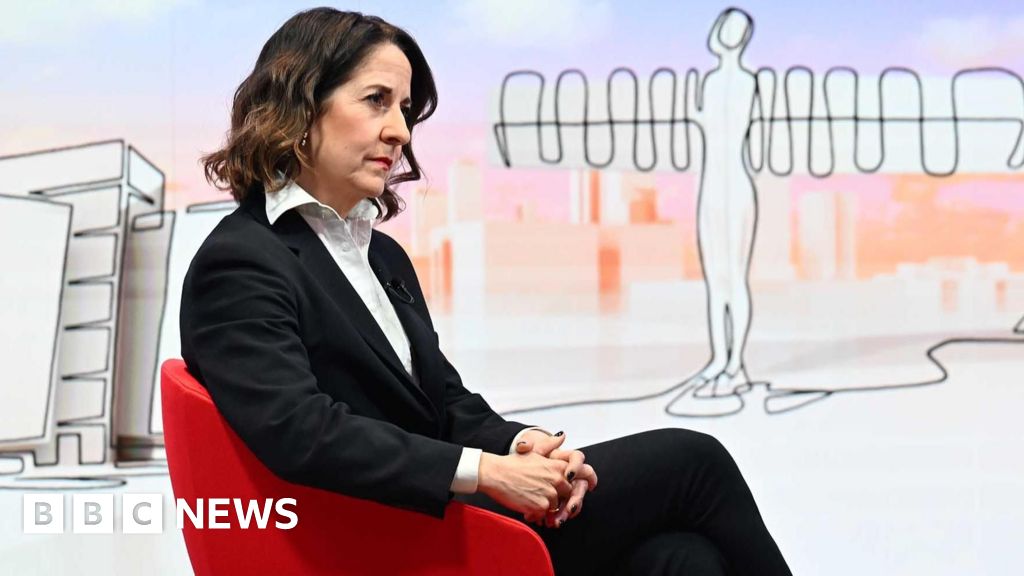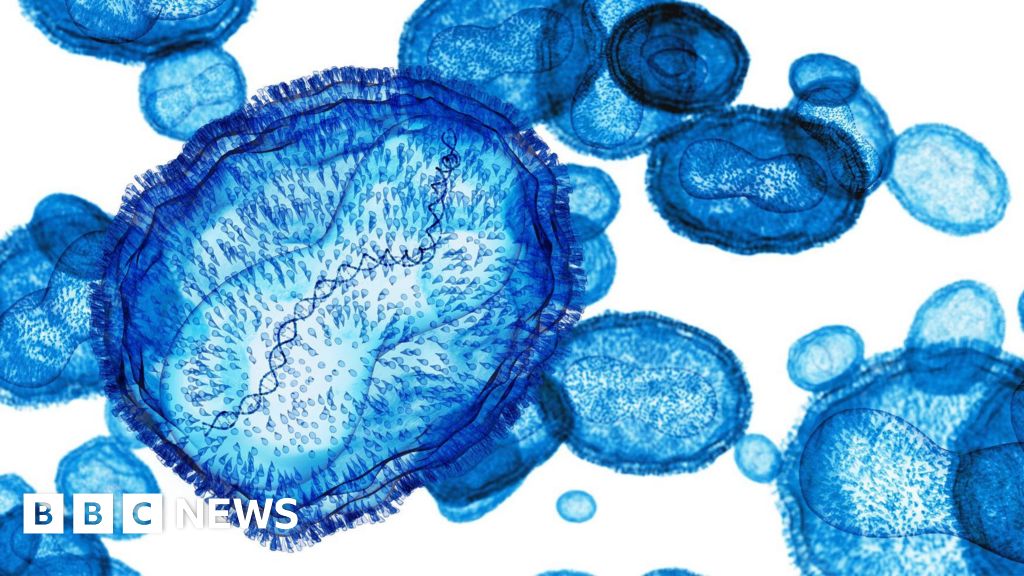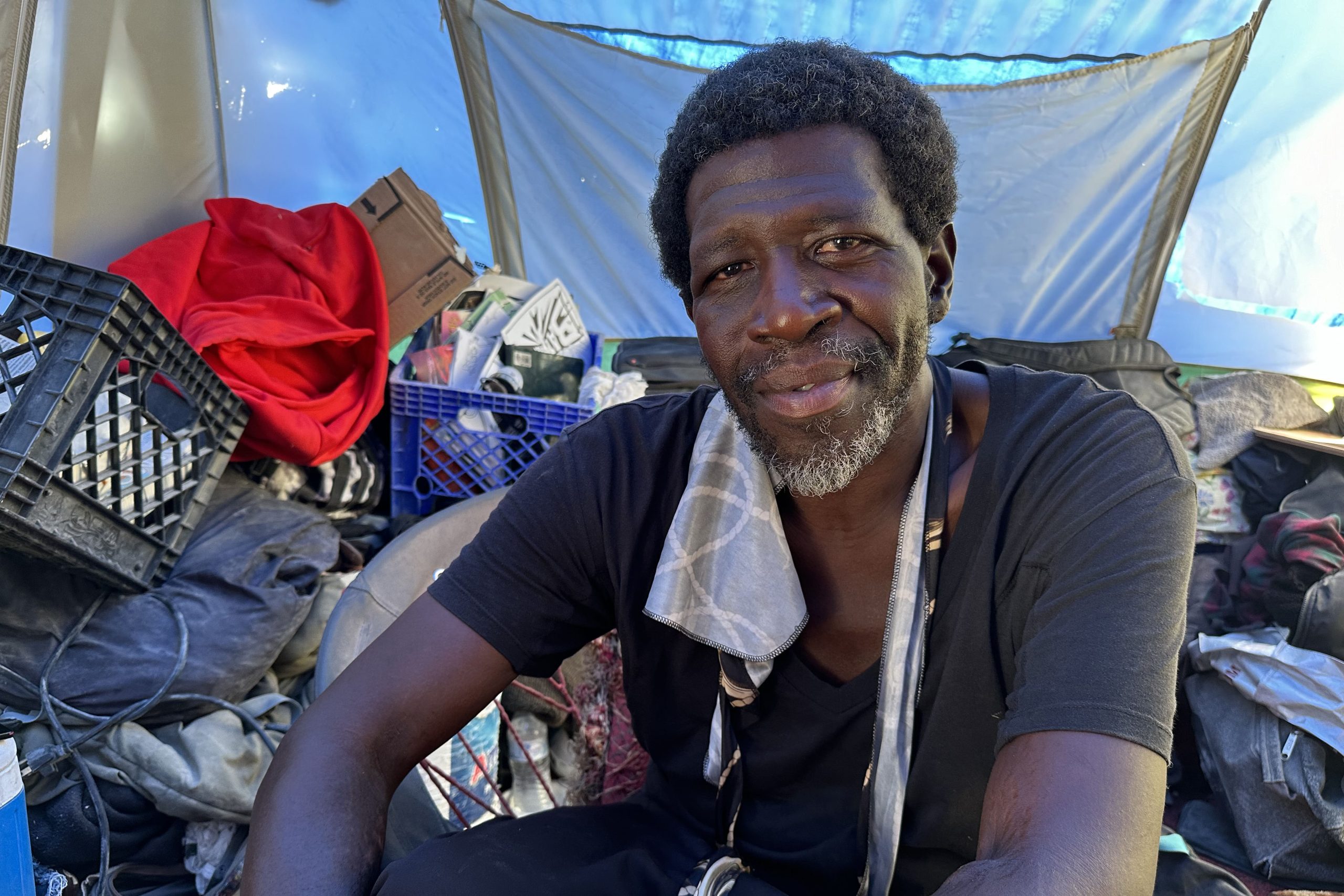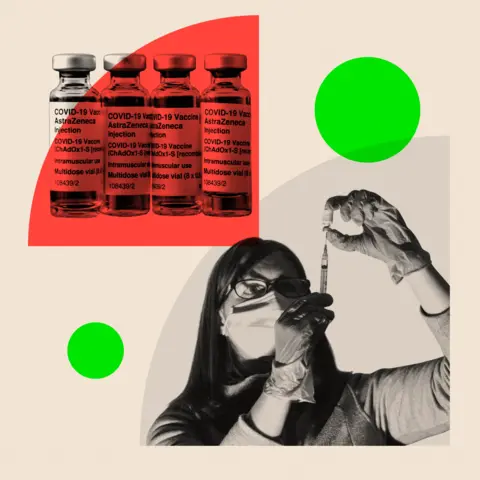 BBC
BBCThere is nothing in life that is free of risk. That includes vaccines. But the evidence is compelling that the benefits of getting immunised with those vaccines recommended in the UK far outweigh the possibility of serious side effects.
The level of benefit from Covid vaccines is well documented. And the Oxford/AstraZeneca vaccine is credited with saving more lives in the first year of its use than any other – 6.3m globally compared to 5.9m for Pfizer/BioNTech’s jab.
However, we need to discuss not just the huge positives that Covid vaccines brought, but also the small minority left injured or bereaved by the AstraZeneca vaccine.
Around 50 families affected by rare blood clots have begun a group legal action for compensation under the Consumer Protection Act, arguing that the vaccine was not as safe as the public were entitled to expect.
This includes people who have been left with severe physical injuries, those who are unable to work, and bereaved families who lost a loved one due to vaccine damage.
They are a tiny fraction of all those vaccinated, but that is no comfort to the families affected, who feel like they have been airbrushed out of the pandemic and that their pleas for support have been ignored.
Those families include Jane and Ian Wrigley from Buckinghamshire.
Jane, 62, used to run, ski and climb mountains. Now she can barely walk due to extreme weakness down her left-hand side.
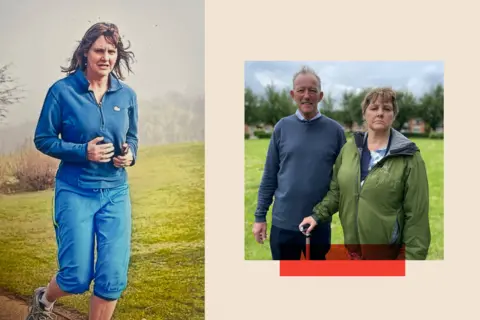 Handout
HandoutTwo weeks after receiving the AstraZeneca vaccine in March 2021, Jane was admitted to hospital. She suffered blood clots in her brain and required emergency surgery to remove part of her skull. Jane’s medical records clearly state that she suffered these blood clots as a direct side effect of the vaccine.
Her husband Ian is now her full-time carer. Jane told me: “Before I had the vaccine I was a very independent, active woman doing half marathons and enjoying my life. Now I’ve lost every bit of independence.”
Her case, and those of others affected by blood clots, raises serious questions about whether the system is letting down those who have suffered serious harm as a result of taking Covid vaccines.
Social contract
Almost 25m adults in the UK received a first dose of the Oxford/AstraZeneca vaccine in 2021, and nearly all those had a second.
It is estimated that the Covid vaccine programme prevented over a quarter of a million hospital admissions and over 120,000 deaths in the UK up to September 2021.
The side effects of vaccination are usually mild and short-lived such as a sore arm, fever and fatigue.
However, in the very rare event that something goes seriously wrong, we have a right to expect that we will be supported. This is a kind of social contract between individual and state.
That’s where the Vaccine Damage Payment Scheme (VDPS) comes in. The VDPS was established in 1979 in the wake of a scare over the safety of the whooping cough vaccine in use at the time.
The government-backed scheme offers a one-off financial payment of £120,000 in the event that, on the balance of probability, a vaccine has caused at least 60% disablement.
Between the late 1970s and 2020 there were just below 6,500 claims under the scheme for all vaccines and 944 awards.

Covid vaccine: Fighting for a payout
The Oxford AstraZeneca vaccine is credited with saving millions of lives but it was also responsible, in rare cases, for serious side-effects – blood clots in the brain – which could be fatal. This is the story of those fighting for compensation.

But something dramatic has happened since the pandemic. There have been more than double the number of claims under the VDPS for Covid jabs than during the previous four decades for all other vaccines combined.
Since the pandemic there have been almost 16,000 claims against Covid vaccines and 180 awards. Just over half of all claimants have yet to find out if they have been successful.
So what is happening? Of the awards, all but a handful are for damage done by the AstraZeneca Covid vaccine, which is no longer used.
There is a long list of different health conditions that qualify for a payment but the AstraZeneca jab had one specific rare side effect not seen in the mRNA vaccines produced by Pfizer and Moderna, which are now the mainstay of all Covid booster campaigns.
The side effect is a type of blood clot, often in the brain, combined with low platelet levels, almost always within a few weeks after receiving the first dose. This can cause damage in the brain and to multiple other organs.
Platelets are cells that help your blood clot, and it was so unusual to see blood clots combined with low platelet levels, that experts coined a new medical term: vaccine-induced thrombosis with thrombocytopenia, or VITT.
These were so unusual that the signal was not seen in the clinical trials of the vaccine involving more than 23,000 participants, but only once the jab had started being rolled out across Europe and given to millions.
In mid-March 2021, a dozen European countries briefly suspended use of the AstraZeneca jab while the clots link was investigated.
Then, in April that year, the UK restricted the vaccine to the over-30s, and a month later to the over-40s because it became clear that younger people were at higher risk from the clots.
Several other European countries, when they resumed using the AstraZeneca vaccine, set the age limit much higher: France to those aged over 55; Germany, Italy and the Irish Republic to the over-60s. Denmark halted its use altogether.
In early April 2021, safety regulators in the UK and Europe had concluded that blood clots combined with low platelets should be listed as a rare side effect.
The rare syndrome was also reported among recipients of the J&J Janssen Covid jab, which uses the same type of vaccine technology, in the United States.
‘Too little, too late, to too few’
Sarah Moore, a solicitor with the law firm Leigh Day, says the families she represents have been driven to sue AstraZeneca because of the inadequacies of the VDPS.
“The scheme offers too little, too late, to too few people,” she says. She describes the £120,000 payment as “woefully inadequate”, pointing out that the figure had not increased since 2007.
Had the sum kept pace with inflation, it would now stand at £197,000.
Ms Moore says some of her clients need 24-hour care, cannot wash or dress themselves, have been left with severe physical or cognitive deficits and will never work again.
The case of Jane and Ian Wrigley also illustrates another criticism of the VDPS: delay.
The couple waited over two years for a payment under the scheme, despite the clear-cut nature of the case. Assessments under the VDPS are done on paper and do not involve physical examination.
Last year, the government announced that it had modernised the operations of the VDPS to allow cases to be processed more quickly and increased the number of staff dealing with claims from four to 80. But a huge backlog of claims has built up.
Peter Schulze, 49, is another member of the group action against AstraZeneca. He too suffered VITT blood clots after receiving the AstraZeneca vaccine in April 2021 and now needs 24-hour care.
His submission to the VDPS was completed in July 2022, yet he is still awaiting a decision, despite VITT blood clots being clearly mentioned in his medical records.
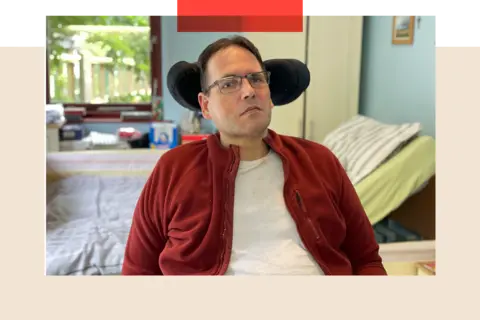
Finally there is the 60% disablement threshold for successful claims, which has ruled out hundreds of people who are officially recognised as having been damaged by Covid vaccines.
Ms Moore says she had a female client who was now blind in one eye, with other physical and psychological injuries, but was told she didn’t reach the 60% threshold.
She says under normal civil claim rules, blindness in one eye could lead to compensation of more than £200,000. It was “absolutely heartbreaking”, she added, for people to be told that the vaccine has caused their injuries yet be informed they are not disabled enough to qualify for a payment.
Who pays?
During the pandemic, the government granted vaccine manufacturers legal indemnity. This did not prevent people from making a claim for compensation against pharmaceutical firms, but determined who would pay in the event of a successful action.
Then-Health Secretary Matt Hancock told the Commons: “We are providing indemnities in the very unexpected event of any adverse reactions that could not have been foreseen through the robust checks and procedures that have been put in place.”
Ms Moore says she has not seen a copy of this legal undertaking but believes it means that the government will pick up AstraZeneca’s legal costs and would be responsible for paying compensation in the event of a successful claim.
AstraZeneca made no profit from its Covid vaccine, Vaxrevia, but its total revenue in 2023 was $45.8bn (£35.1bn) with profits of $5.9bn.
In May AstraZeneca withdrew Vaxrevia citing a “surplus of available updated vaccines”. The UK government did not buy any doses for its booster programmes and all Covid vaccines used in the UK for this autumn’s booster campaign are either Pfizer or Moderna, both of which use mRNA technology.
Prof Adam Finn is one of the UK’s leading experts on vaccines, and throughout the pandemic was a member of the JCVI, the body which advises the government on immunisation.
He was involved in key decisions on recommending the order in which the public received Covid vaccines and the age restrictions put on the AstraZeneca jab when the clots risks emerged.
Prof Finn, who is professor of paediatrics at the University of Bristol, says Covid vaccines were a massive success and “really saved a lot of people’s lives”. He is not involved in the legal action and believes the decisions taken in the UK around the vaccines’ use were correct.
But he says the VDPS is “clearly not working as it should” and that payments should be index-linked so that they reflect changes in the cost of living. He also criticises the “very arbitrary” 60% threshold for payouts.
Prof Finn adds that it’s necessary “to take a really good look” at compensation for all current and future vaccines.
I point out to Prof Finn that there was a danger in a report like this that it could undermine confidence in vaccines. He rejects this: “The only way to retain trust is to be honest.”
But he does think the inadequacies of the VDPS risk undermining that public confidence in vaccines.
While only a small proportion of people have been affected, he says, “they’ve been very seriously harmed and that is going to attract public attention. It’s going to be reported, and people are going to reflect on that, and people will want to see those people treated fairly”.
In a statement, AstraZeneca said: “We cannot comment on ongoing litigation. Our sympathy goes out to anyone who has lost loved ones or reported health problems. Patient safety is our highest priority.”
The statement added that AstraZeneca’s vaccine “has continuously been shown to have an acceptable safety profile and regulators around the world consistently state that the benefits of vaccination outweigh the risks of extremely rare potential side effects”.
The health secretary Wes Streeting recently met with people who have been injured or bereaved as a result of vaccine damage.
In a statement the Department of Health and Social Care (DHSC) said the meeting was to “listen to their concerns” and said “the government will look closely at these as we continue to learn and apply the lessons of the pandemic”.
The statement added: “Our deepest sympathies are with those who have suffered harm.”
The DHSC said the administrator of the VDPS had made operational changes to the scheme in an effort to reduce the time claimants wait for an outcome.
The workings of the VDPS will be considered in the next module of the Covid inquiry, which will begin taking evidence in January 2025.
Ms Moore, who expects to give evidence to the inquiry, says her clients are not “anti-vax”.
She says: “We are acting for people who stood up and got vaccinated. By definition they’re all pro-vaccination. This is an act to support vaccine confidence.”
As for the legal action against AstraZeneca, that could drag on for years.
Additional research by Catherine Snowdon
BBC InDepth is the new home on the website and app for the best analysis and expertise from our top journalists. Under a distinctive new brand, we’ll bring you fresh perspectives that challenge assumptions, and deep reporting on the biggest issues to help you make sense of a complex world. And we’ll be showcasing thought-provoking content from across BBC Sounds and iPlayer too. We’re starting small but thinking big, and we want to know what you think – you can send us your feedback by clicking on the button below.

